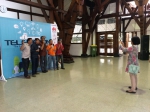Prof. Nana Delivered a Scientific Speech on Visionary Perspective of Applicative Telecommunication Technology for Indonesia

BANDUNG, itb.ac.id – Mastering telecommunication technology is a must. With its potency for consumption and the challenge of inequal development of network infrastructure, it would be unfortunate if Indonesia depends so much on foreign technology.
Independency in telecommunication technology is asserted by a professor from School of Electrical Engineering and Informatics (STEI) of ITB, Prof. Dr. Ir. Nana Rachmana Syambas M.Eng., in his scientific speech about “Anticipating the Development of Telecommunication Technology in the Future” in Aula Barat ITB, Jalan Ganesa, on Saturday, (28/7/2018). Prof. Nana also delivered the result of his research and innovation in telecommunication.
Prof. Nana said that the massive use of social media has pushed the need for more complex network. Industrial age 4.0, with its cyber-physical-system, demands faster networking response. Development of technology is shadowed by the consequence of enhancement of global data traffic. Therefore, existing IP-based network will find difficulty and inefficiency in the future because host-centric end-to-end interconnection works by enhancing capacity or spectrum.
Content based network, better known as NDN (Named Data Network), emerges as the pretext to change ‘where’ with ‘what’. In short, data requests from network users are no longer addressed to certain IP address but to certain content.
“Based on access network statistics, NDN is highly suitable network scheme implemented both in metropolis or regions that are catching up with the development of telecommunications network infrastructure. For example, on developing regions, demanded contents are relating to agriculture, plantations, and so forth. Development of efficient NDN access system in bandwidth usage is expected to accelerate network access to many remote regions in Indonesia,” Prof. Nana said.
Prof. Nana has proven that NDN network has better parameter delay performance, parameter packet loss, and throughput after it is simulated to Indonesian Higher Education Network (Inherent) and PALAPA Ring. He also studied in depth about routing, caching, and forwarding on NDN system. The research is still continually conducted in order to get commercialization as national flagship product in 2021-2022.
Radar for Protection to Indonesia’s Sovereignty
Maintaining the security of Indonesia, which consists 17.000 islands, is no easy task. Hence, the capability to mapping and remote sensing the regions in Indonesia is a challenge.
Besides, global climate change and Indonesia’s geographic condition have caused varied climatology phenomena throughout the year. It lures the need for radar, both for prediction and prescriptive purposes. Besides weather radar, air surveillance radar for domestic flights security is also needed.
Radar is a highly prospective technology to develop for regional control and surveillance, including on Indonesia’s Exclusive Economic Zone. Radar works by sending electromagnetic wave to an object and receive information about the object based on received reflection parameter. Different objects have different reflective signal patterns.
Prof. Nana, who in 2016 was the team leader of the initial stage of project ‘Building Independence National Radar Industries’ funded by Kemenristekdikti, said that in addition to the construction of national radar components from scratch, software for radar signal processing was also developed with the help of ITB researchers team.
“This developed radar technology is expected for application on other type of radars for protection and mapping of Indonesia’s territory and precaution against natural disasters that may arise,” he said.
Prof. Nana and team claimed to have tried making radar by optimizing various local resources. The result is considered satisfactory because the signal spectrum processing is as good as INDRA’s and TU-Delft’s, and even sharper on its LDR parameters.
He succeeded in creating a GPR (Ground Penetrating Radar) algorithm that enhances accuracy of received radar reflection pattern by formulating correction factor for difference of ideal condition and real condition. Thus, the process of detection of various objects in the soil is more reliable.
Other research conducted by Prof. Nana is related to performance analysis of GPON, XGPON, and hybrid technology application to increase the capacity of broadband access users. For physical network in the backbone, he has also developed the optimum algorithm for ring configuration.
Telecommunication technology has undeniable role in the development of world economy. Therefore he advised the next generation to always work in that field. Because he thinks that research in telecommunications will always open wide and promised new invention and breakthrough.
“Mastery in telecommunication technology is a must for Indonesia in order to have important role in the development to build independence of national telecommunication industry,” concluded Prof. Nana.
Reporter: Karimatukhoirin

scan for download







